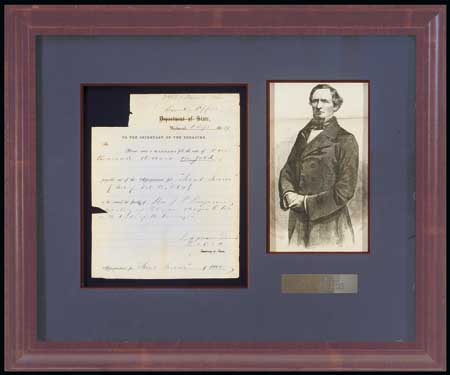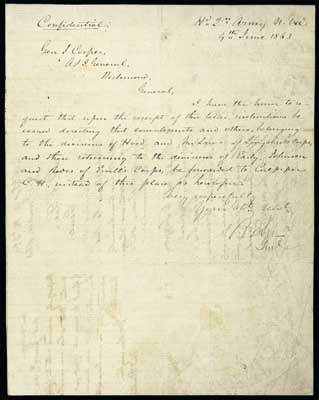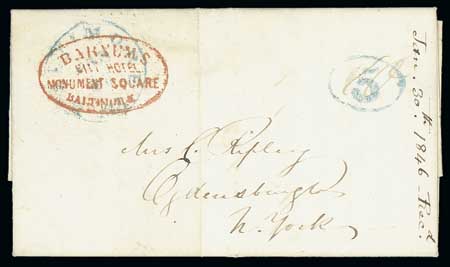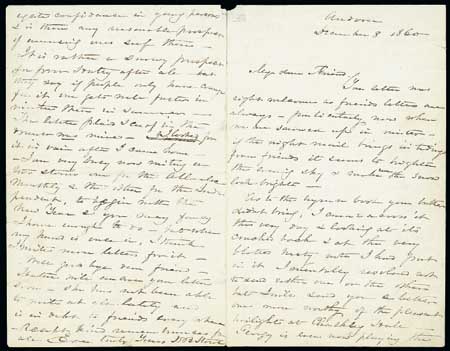| Lot |
Photo |
Description |
Lot 1080 |
 |
Davis, Jefferson Finis (1808-1889), Only President of the Confederate States (1861-1865), U.S. Representative (1845-1846) and Senator (1847-1851, 1857-1861) from Mississippi, Secretary of War under Franklin Pierce (1853-1857), son-in-law of Zachary Taylor. partly-printed Document Signed, one page, 8 x 9½ Richmond, September 1, 1864. Warrant to the Treasury Department, in full (underlined words in Davis’ hand):
"Richmond, 1 Sept. 1864
TO THE SECRETARY OF THE TREASURY,
Sir:
"Please cause a WARRANT for the sum of one thousand dollars in gold, payable out of the Appropriation for "Secret Service" (Act of Feb. 18, 1864) to be issued in favor of Hon. J.P. Benjamin, Secretary of State, and charged to him on the books of the Treasury.
"Jefferson Davis
Pres’t C.S.A.
"Appropriation for "Secret Service" $1000
There is a small piece missing at the left edge and a 2" square cut from the upper left corner with some splitting of folds at upper right and light uneven browning of the paper. Nonetheless, a Fine and rare document mentioning the Confederate Secret Service and, because the $1,000 was specifically requested to be paid in gold, hinting at the official lack of faith in Confederate currency. Framed to an overall 23½ x 19½ with an engraved ¾-length portrait of Davis and a steel-engraved legend.
Estimate 6,000 - 8,000
This printed form was intended for State Department use but has been altered by Davis. At the top he has penned "Executive Office" above the crossed-out heading "Department of State", and below his "Pres’t C.S.A." he has crossed out "Secretary of State".
During the Civil War, a number of secret operations were mounted with various degrees of official oversight. Many of these operations involved acts that were considered by the Union to go beyond the normal conduct of "civilized" warfare. Some of the operations allegedly planned included setting fires in New York City hotels (Election Day plot of 1864), poisoning the New York City water supply, infecting Union soldiers and citizens with smallpox and yellow fever, kidnapping President Lincoln and holding him until Confederate soldiers were released and blowing up the White House. By 1864 the Confederate government was attempting to gain control over these operations. In February of that year the Confederate Congress appropriated $5 million to fund the Secret Service which was run primarily out of Canada.
In April of 1865 most of the official papers of the Secret Service were burned by Confederate Secretary of State Judah P. Benjamin just before the Confederate evacuation of Richmond, and the full story of Confederate secret operations went up in flames.
View details and enlarged photo
|
Lot 1081 |
 |
Lee, Robert Edward (1807-1870), Commander-in-Chief of Confederate Army (1865), surrendered to Ulysses S. Grant at Appomattox Court House, superintendent of U.S. Military Academy (1852-1855). Civil War Dated Letter Signed, one page, 7½ x 9½ "Hd Qrs. Army N. Va.", June 4, 1863. To General Samuel Cooper, Adjutant & Inspector General:
"I have the honor to request that upon the receipt of this letter, instructions be issued directing that convalescents and others, belonging to the divisions of Hood and McLaws of Longstreet’s Corps, and those returning to the divisions of Early, Johnson and Roves of Ewell’s Corps, be forwarded to Culpeper C.H., instead of this place as heretofore. Very respectfully, Your obt. servt. (signed) R E Lee, Genl"
Endorsed on reverse by "S Cooper, A & I G" and by Wm. A. Carrington, medical director of Richmond area hospitals. Tipped to backing sheet along top edge, Very Fine.
Estimate 5,000 - 7,500
View details and enlarged photo
|
Lot 1082 |
 |
Ripley, James Wolfe (1794-1870), Brigadier General in Union Army during Civil War, Chief of Ordinance who opposed introduction of breech loaders, and then Inspector of Armaments on New England Coast. Autographed Letter Signed, two pages (with two integral blank leaves), 7¾ x 9¾ Baltimore, January 24, 1864. To Mrs C. Ripley, New York. With address leaf showing red Batums Hotel cachet, blue Baltimore c.d.s. and handstruck "5", vertical filing fold. Fine.
Estimate 400 - 500
View details and enlarged photo
|
Lot 1083 |
 |
Stowe, Harriet Elizabeth [Beecher] (1811-1896), American novelist and abolitionist, author of "Uncle Tom's Cabin, or, Life Among the Lowly" (1852) (previously published serially in The National Era 1851-1852), brother of clergyman and abolitionist Henry Ward Stowe. Autograph Letter Signed, four full pages, 4½ x 7, Andover, Mass., December 8, 1860. Chatty personal letter to "My dear Friend", Stowe talks mainly of family matters but waxes poetic in the beginning with "Your letter was right welcome as friends letters are always — particularly now when we are snowed up in winter — if the night mail brings in tidings from friends it seems to brighten the evening sky & make even the snow look brighter —", later she mentions the coming Civil War: "Are you not afraid of the secessionists? — There may be a war and Chalkley Hall be sacked for aught you know — Just think of the danger —" She closes at the very bottom of page four with "Ever truly Yours H B Stowe". Fine condition, though the two leaves are nearly separated and there is a tiny nick at the top.
Estimate 1,000 - 1,500
This letter was evidently written to one of the children or grandchildren of Thomas Chalkley, a travelling Quaker minister, and contemporary of her father, Lyman Beecher. The family resided at Chalkley Hall near Fankford, Pa.
View details and enlarged photo
|
|